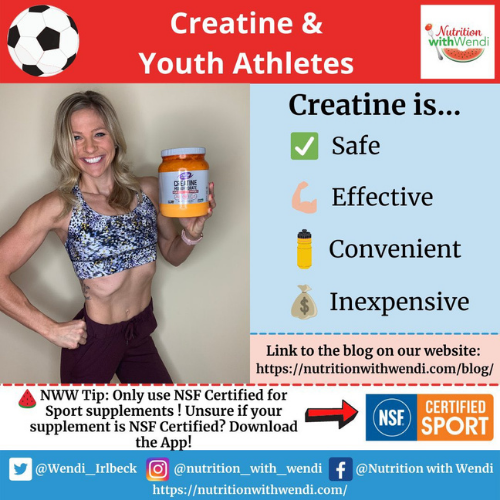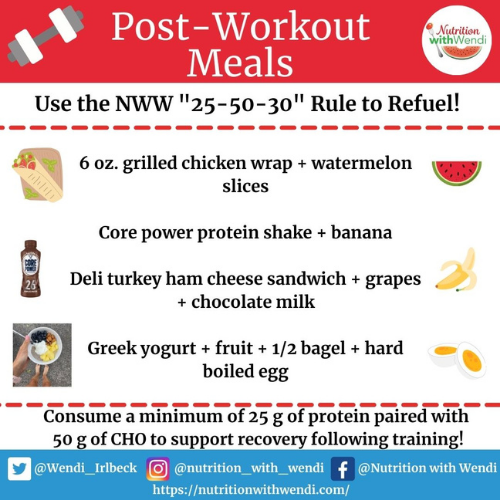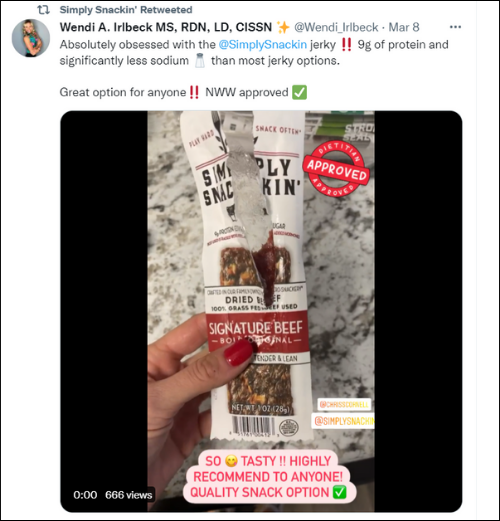Pull-ups, Protein & Performance
Posted by Chris S. Cornell on 18th Mar 2022
Registered Dietitian Nutritionist Wendi Irlbeck talks about dietary & lifestyle changes that can improve strength, endurance, mood, energy, & quality of life
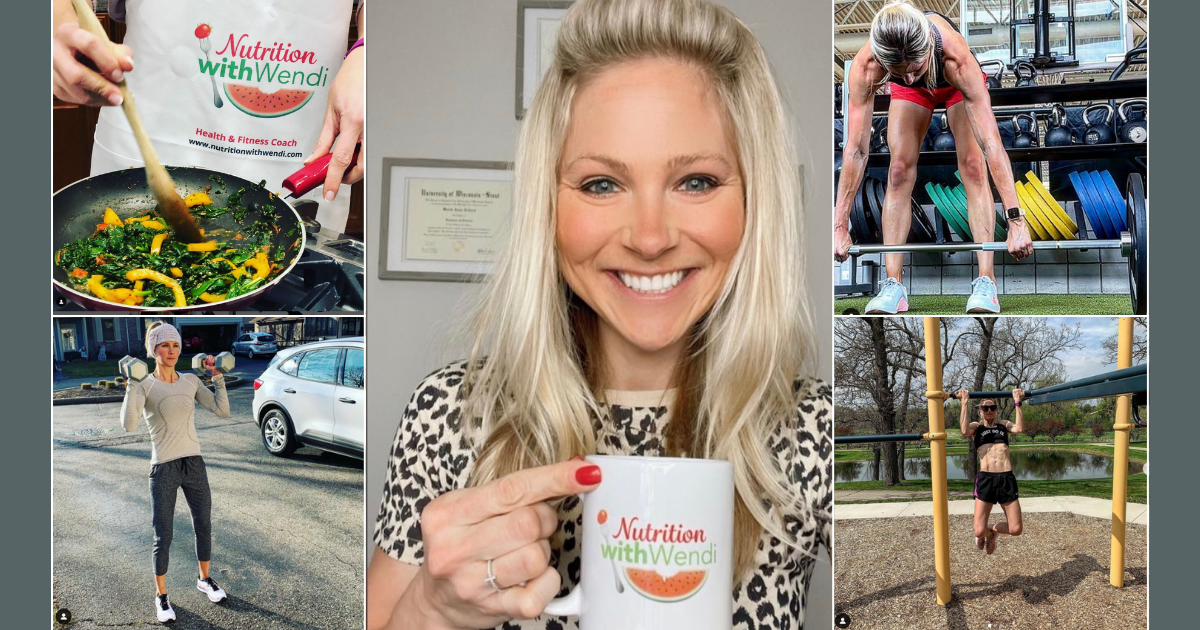
Chris S, Cornell writes about nutrition and fitness. Information is for informational purposes and is not medical advice. Consult a qualified practitioner for advice.
By Chris S. Cornell
The first time we noticed Wendi Irlbeck, MS, RDN, LD, CISSN, in our Instagram feed, she was knocking out pull-ups effortlessly and we were seriously impressed.
We soon learned she is a registered dietitian nutritionist and performance coach, who has built a career around using evidence-based science to create nutrition programs for athletes to optimize performance, minimize health risks, and enhance recovery from training while focusing on injury prevention.
Both her Instagram and Twitter feeds revealed she possesses an incredible amount of knowledge and insight on a wide range of topics related to nutrition, sleep, stress, athletic performance, mood, energy, and overall quality of life.
In August 2019, she founded Nutrition With Wendi, a health, fitness and nutrition consultation service that partners with athletes, business professionals, coaches and teams.
I had the opportunity to speak with Wendi last month, and she left me with dozens of pages of notes, hours and hours of her podcast interviews, and links to several incredibly useful articles she’s authored.
Wendi talked about protein (and how most of us would do well with more), creatine (a supplement she says is highly underrated and useful for both men and women, and even young athletes), meal timing, beef and eggs, sports nutrition tips for young athletes, couples training, and more.
As someone who couldn’t do a single pull-up at age 50, I couldn’t resist asking her about the ease with which she churned out one pull-up after another. Her response was inspiring.
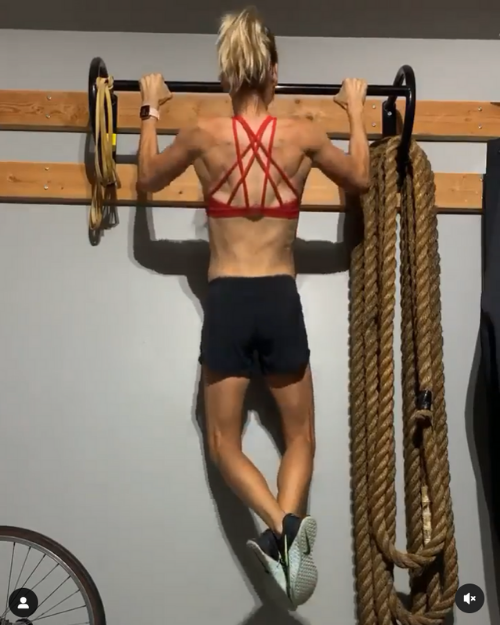
“So many people think I just started off doing a bunch of pull-ups,” said Wendi, who was a softball pitcher in college and competed in both softball and cross country in high school. “I think it’s important for people to know that I couldn't do a single pull up properly in 2018. And I was like, this is trash. I'm an athlete, I need to focus on this.”
Wendi started out doing one pull-up at a time, and was determined to progress.
“One became two, then two became three. Every day after my workout, I would do them. So now I'm able to crank out 12 to 15. I've been doing that since 2018. Every single day I’m working on it.”
Wendi says people often want to quit because they can’t do something well, not realizing they are capable of far more than they realize.
I tell them “Don't be afraid. Don't be intimidated. You know, we all start somewhere.”
Wendi works extensively with high school and college athletes at the top of their game, but she made it clear that just about anyone can benefit from the advice and coaching from a qualified registered dietitian and performance coach.
When asked about the most common mistakes people make when it comes to nutrition, Wendi immediately started talking about protein and why most people should strive to consume more.
How much protein should I eat?
When Wendi talks about nutrition, the topic of protein is a recurring theme—whether she’s discussing high-level athletes, couch potatoes, those struggling with obesity, people over 50, and just about any other demographic you can think of.
A very large percentage of the population, she says, doesn’t understand the importance of protein, and how much is enough for optimal outcomes.
One cause for confusion, according to Wendi, is that the Recommended Dietary Allowance (RDA) for protein “is a measly 0.8 grams per kilogram of body weight.”
“The RDA refers to the minimum amount you need to keep from getting sick, not the actual amount you should consume each day,” explained Wendi. “Many professionals mistakenly use the RDA to make recommendations to their patients, clients, and athletes.”
Using the RDA of 0.8 grams per kilogram of body weight, a person who weighed 175 pounds (79 kg) would consume just 64 grams of protein.
Wendi explained that research has shown many benefits associated with significantly higher levels of protein consumption.
“Research by the Protein Summit 2.0 has indicated that 1.0 -1.2 grams per kilogram of body weight per day is beneficial for healthy metabolic function,” she said. That would translate to 79-95 grams of protein per day for that same 175 pound person, but Wendi says substantially higher levels are often warranted.
For building and maintaining muscle mass, she says 1.4-2.0 grams of protein per kilogram of body weight per day is a reasonable target, but there is evidence to support some strength-trained athletes consuming as much as 3.0 g/kg/d, which translates to 238 grams of protein per day for a 175-pound person.
Wendi said she aims to consume approximately 2.0 g/kg/d of protein to support her health and performance goals. At about 130 pounds, that translates to about 118 grams of protein per day.
As part of the nutrition and performance coaching services she offers, she helps athletes and those just looking to improve aspects of their life to learn what levels will work best for them.
“Different individuals have different needs, and context is key,” she said.
Wendi has written extensively about protein, including in this article, entitled “ Evidence You Should Consume More Protein from a Dietitian Who Lifts!”
In this informative article, Wendi says we need to consume more high-quality protein each day for many reasons. Protein is beneficial for:
- Muscle growth
- Strengthening bones
- Hormone regulation
- Quicker recovery
- Supporting lean mass gains
- Suppressing appetite and promoting satiety
- Preventing chronic ailments associated with aging
- Protecting immune system against illness and injury
- Weight loss during times of energy restriction
Wendi explains that a high-protein diet can help in the process of losing weight, improving body composition, building lean mass, increasing satiety and helping to maintain a calorie deficit over time.
Given those benefits, why wouldn't everyone consider adding more protein to their diet?
But what about the persistent claims that consuming too much protein can be harmful to the kidneys or bones or that it will cause weight gain?
Wendi says those are myths that continue to plague the nutrition world.
“Most people will benefit from eating more high-quality protein. It won’t make you fat, harm your kidneys or bones. It will support muscle growth and aid in recovery while helping to prevent age-related muscle loss.”
She advises her clients to aim to consume 25-30 grams of protein at each meal, but said it’s a myth that the body can only absorb 20 grams of protein at a time.
“That's not true,” she said. “Our body uses what it needs. So if you're someone who is doing a lot of training or if you're trying to facilitate a calorie deficit to lose fat, you're going to benefit from consuming more protein, and your body can absorb what it needs. There are still a lot of dieticians who believe you can't eat more than 20 grams of protein at a time because it's going to make you fat or that it’s going to decrease your bone mass. It’s outlandish.”
Misconceptions about beef & eggs
Just as there are unsupported myths about protein, Wendi has worked to clear up misconceptions about specific foods like beef and eggs, which she says are great for helping people reach their protein targets.
“I love beef. It is a great source of protein, iron, folate, B vitamins, and it’s delicious and healthy for you,” she said. “Unfortunately many people will blame steak for things, when really we should be blaming the processed foods in their diet, the excess ice cream and the excess potato chips. It's not the steak that's the problem.”
The same blame game occurs with eggs, according to Wendi.
“People blame eggs for their high cholesterol when it's often their lack of exercise, their lack of water, alcohol consumption, or the processed sugar and refined carbohydrates,” she said.
“The problem is that people read the headlines, and they make up their mind without even doing further investigation. It’s important to get the full picture and understand things.”
Wendi explained that working with a dietician can help an individual identify the ideal percentages for their macronutrients (fats, carbohydrates and proteins) according to their goals.
“The dietitian can titrate the macros according to one’s physical activity, health history, and overall goals,” she explained. “If someone has a history of cardiovascular disease, or family challenges related to diabetes, they should be on high alert for their carbohydrate intake, and make sure they're focusing on protein. That should always be our number one macronutrient, focusing on protein first.”
Wendi did a great interview about eggs with Tom Holland on his Fitness Disrupted podcast. During the interview, Wendi cites studies that have led to some of the misconceptions about eggs, and she discusses the limitations of observational studies that are often based on questionnaires that rely on a person’s memory and are sometimes used to interpret a person’s health for the following 20 to 30 years.
Wendi did another great interview with Tom Holland on the topic of fruit, and takes on some of the misconceptions about fruit floating around in the nutritional world. For a complete list of the podcasts Wendi has appeared in, visit this Spotify playlist.
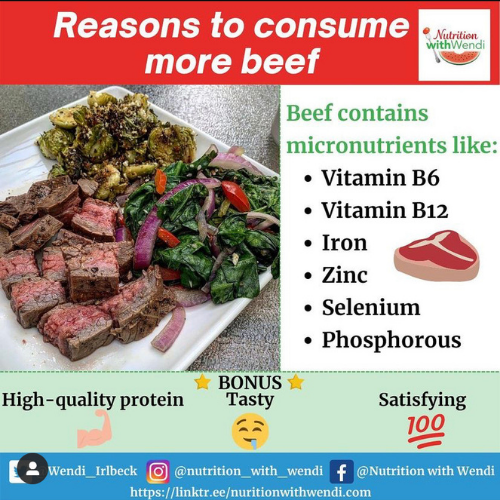
Creatine–Is it Really Safe for People of All Ages?
During our extensive conversation about the importance of protein in a person’s diet, Wendi brought up the topic of creatine, a substance found naturally in many animal-based foods such as meat, fish, & poultry, but also available as a supplement.
There is a great deal of confusion about creatine, Wendi explained, but she said it is not only safe—it’s absolutely essential for the human body.
“I want to be very clear,” she emphasized. “This is not my opinion. This isn't what Wendy Irlbeck thinks, this is what the science says. Creatine monohydrate is not only safe, it's beneficial. “
So what is creatine?
“Creatine is a naturally occurring compound formed by three amino acids,” said Wendi, “making it a tripeptide of the amino acids L-glycine, L-arginine, and L-methionine. Creatine is assembled in a two-step process that occurs in the kidneys and liver.”
Sounds complicated. How does creatine help us?
“Creatine is one of the most effective ergogenic (intended to enhance physical performance, stamina, or recovery) aids,” Wendi explained. “It effectively increases lean mass, strength, power, speed, and exercise capacity. It helps us reproduce ATP, which is a cell's energy currency, and the more ATP we have, the more likely we are to be bigger, faster, stronger, quicker.”
But what about the connections between creatine and steroids?
“Creatine is not a steroid, it’s free of any banned substance,” said Wendi. “There’s a lot of misinformation out there, and many people don’t understand. Creatine is an ingredient in some other supplements, but creatine is not the problem.”
Wendi takes on this issue (and several others) in an informative article she wrote for Coach and A.D. magazine, entitled 5 Things You Need to Know About Creatine.
Who can benefit from creatine?
“Creatine is beneficial to all populations,” said Wendi, who has written an extensively researched article entitled Should Youth Athletes Use Creatine? She also dispelled many myths about creatine in another informative article, entitled Creatine: Not Just for Men or Muscle.
“Since creatine restores ATP, it gives muscle cells the ability to produce greater energy. The greater creatine stores you have, the greater energy your muscle cells can yield during high-intensity exercise, thus leading to increased exercise performance.”
Wendi says she recommends creatine for the high school athletes she works with, both male and female. But she says the supplement can help people of all ages and activity levels.

What type of creatine is recommended?
Wendi recommends creatine monohydrate, because that’s the form that is backed by the most robust research. She also suggests only using supplements that are third-party tested for safety, purity, and compliance, and are NSF Certified.
“Anyone of any age or activity level looking to improve their health can safely consume 3-5 grams of creatine monohydrate immediately post-workout paired with a carbohydrate. Creatine is like the Swiss Army knife of supplements,” she said.
“So if you have a pulse, creatine is for you, especially if you're a high school athlete, because your body's under a lot of stress. So why wouldn't you use something that is so low cost, and it is safe?”
Wendi discussed How to Use Creatine to Improve Health & Wellness with Dr. Bradford Cooper, and she was a guest on Gerry DeFilippo’s Muscles and Management podcast, where she talked about Everything You Need to Know About Creatine.
But Don’t Forget the Basics
Wendi describes a supplement like creatine as the “icing on the cake,” but urges anyone who uses it to first address the foundational elements of health and nutrition.
“Obviously, we need to take care of proper hydration, getting seven to nine hours of sleep at a minimum, and eating the right foods at the right times. Otherwise it's like rearranging furniture on a sinking ship. You need to take care of the basics first.”
Helping student athletes perform
Through her individualized coaching and performance training, Wendi has helped thousands of athletes improve their athletic performance, minimize health risks, and enhance recovery from training while focusing on injury prevention.
She has written countless articles, delivered scores of presentations, and granted dozens of interviews with the underlying objective of helping them achieve their individual goals and improve their overall quality of life.
When asked what steps athletes can take to achieve the biggest gains, she stressed focusing on the basics first.
She said that many parents pay thousands of dollars on equipment, specialized camps and exclusive coaches, but sometimes overlook the critical importance of proper nutrition, hydration, meal-timing, and sleep.
Wendi provides nutrition counseling and education with in-person, phone, or telehealth visits aimed at addressing specific demands the young athlete faces with fueling and hydrating.
She designs individualized meal plans, workouts, grocery lists, and more, that are tailored specifically for the individual and their goals. One of the most important benefits for many of her athletes is the accountability the program introduces to their day-to-day lives.
As one might expect, typical athlete goals often include increased strength and endurance, weight loss (or gain), injury prevention, and stress reduction. Properly planning out meals and meal timing goes a long way to helping address all of those goals.
Examples of the advice Wendi gives can be found in her Twitter and Instagram feeds. One popular graphic explains her “25-50-30 rule”, which suggests athletes aim to consume 25 grams of protein paired with 50 grams of carbohydrates within 30 minutes of activity for the purpose of reducing muscle breakdown and supporting training adaptations.
Wendi continues to stress the importance of protein for her athletes, and advises them to avoid skipping meals and missing opportunities to fuel properly.
“Too many kids are not eating breakfast, they're not having a snack, and most aren't really eating a source of protein until lunchtime,” she said. “So by powering up with protein and produce, the first meal of the day can set the tone for our neurotransmitters that can also help with academic performance and cognition."
Wendi advises her athletes to start the day with a protein source like a Greek yogurt parfait, hard boiled eggs, or an omelet. “Get your source of protein with some produce and you're out the door.”
She is also a fan of milk, which is a rich source of leucine and great for muscle protein synthesis. She also strongly encourages proper hydration, which can be easily addressed with a water bottle (both by the bed, and in the backpack or athletic bag).
Wendi helps athletes determine how much food they need, as well as which types, with an eye on balancing blood sugar levels throughout the day,
While aiming to moderate heavily processed and refined carbohydrates, Wendi stresses that healthy carbohydrates in the form of fruits and vegetables, including starches, play an important role in fueling a healthy athlete.
She helps athletes with the process of preparing healthy meals, and conveys the importance of having healthy, on-the-go snacks available to keep energy levels where they need to be.
“Some of the other key takeaways include shutting the phones down by 9:30 pm and making sure they can get the sleep they need,” said Wendi. “Some of the key fundamentals may not seem earth-shattering or groundbreaking, but most high school athletes are not doing those things consistently. And that's really where the magic takes place.”
Building Atomic Habits
Because of the value Wendi places on accountability, especially for anyone looking to improve their health, nutrition, fitness or performance, she frequently references principle in the book, Atomic Habits, by James Clear.
The book aligns well with the accountability that comes from signing up for Wendi’s student athlete coaching package. The program includes check-in sessions, a weekly process that involves building habits, and habit stacking.
“The parent and the athlete get involved in the process,” said Wendi, “and by the end of the program they know how to prepare their breakfast, lunch and dinner, a second breakfast, a post workout, a pre-workout meal, they know how to use creatine, and they know how to go to bed. That adherence comes from me working together with them.”
Wendi says she also integrates her beliefs and values as a Christian into everything she does. “God is a part of our conversation, and our foundation is the fact that they're glorifying God in the process.”
Couples training
Wendi has recently added couple's group nutrition coaching to her practice, which can help address issues such as weight loss, high cholesterol, pre-diabetes, or other concerning lab results. Through a series of weekly online meetings, and access to a dedicated Facebook group, Wendi is able to guide the participants to adjust their way of eating to effect positive change.
“This is another area where context is key,” said Wendi. “What works for one person doesn't always work for another. Their doctor may have told them to go home and eat a bunch of whole grains, but whole grains may not be the best choice for somebody who's pre-diabetic. We want to focus more on protein, green vegetables, broccoli, spinach, asparagus, zucchini—even sweet potatoes, or apples, that can help reduce cholesterol too.”
“Part of what I do is really helping couples come together for the best interest of the long-term health for the family. In order to do that we've got to change the way of eating and it's got to happen now.”
Wendi has seen couples get their lab work done after six weeks or so with noticeably improved results. “The triglycerides come down, the blood sugar is below 100, and we're no longer looking at potentially being on a statin or Metformin, which is super awesome.”
Simply Snackin'
We sent Wendi a box of Simply Snackin’ high-protein, low-carb, beef and chicken snacks to sample, and we were thrilled to learn she approves.
“Absolutely obsessed with the Simply Snackin’” she wrote. “Great option for anyone!! NWW (Nutrition With Wendi) approved”


